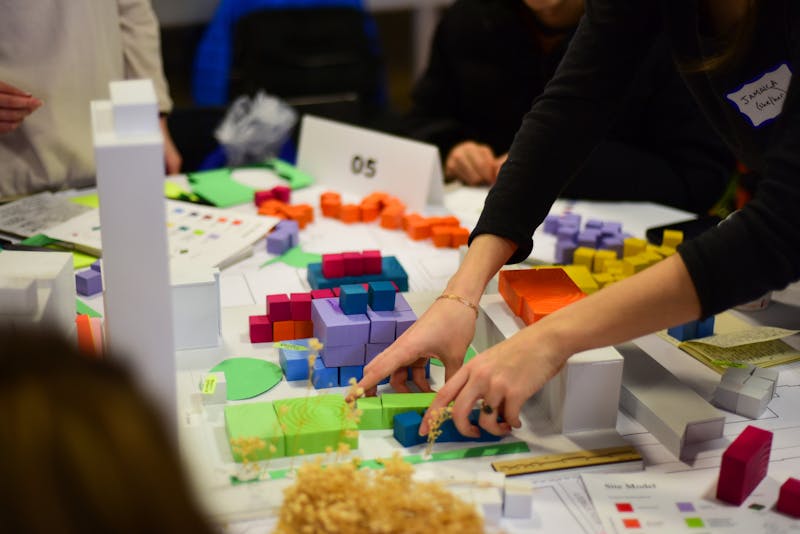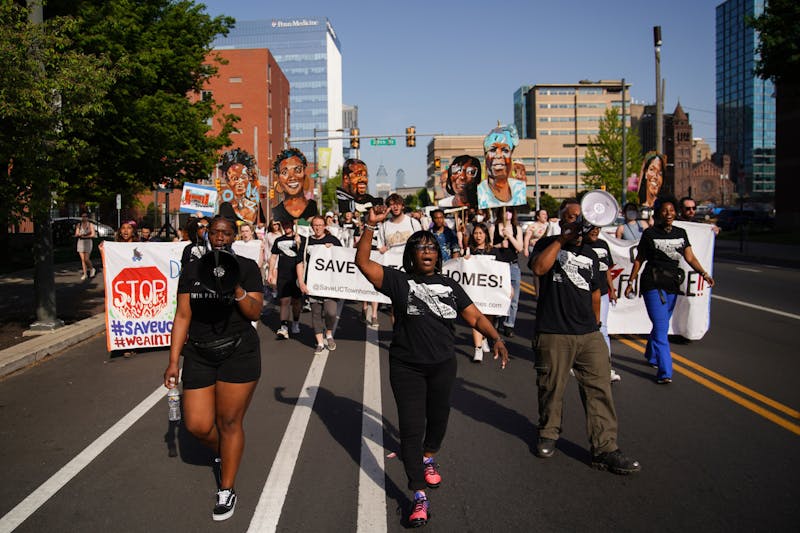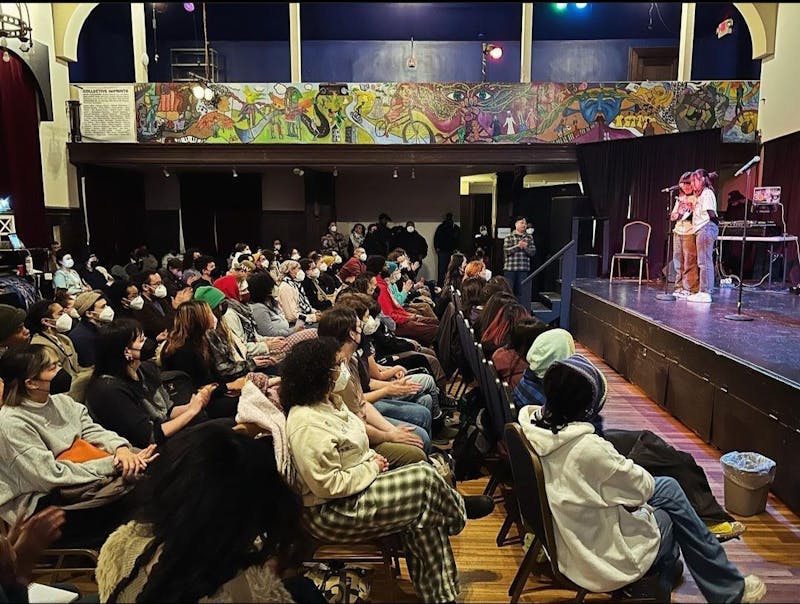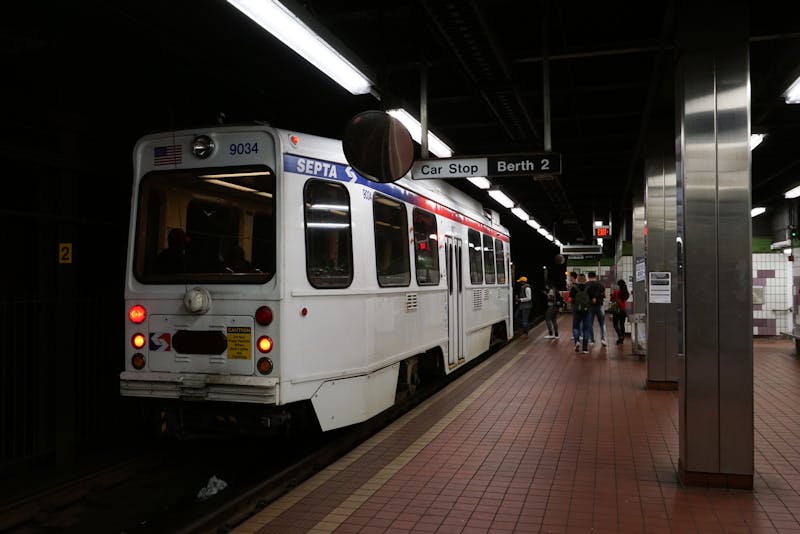
Penn Architecture students facilitate conversations at the Market East design workshop at the Center of Architecture and Design on Jan. 27.
Credit: Chenyao LiuEighteen months after the Philadelphia 76ers announced plans to construct an arena, The Daily Pennsylvanian spoke to representatives from 76DevCo and various community activist organizations about how their work has progressed in recent months.
On July 21, 2022, the Philadelphia 76ers announced plans to construct an arena, known as 76 Place, at the 1000 blocks of Market and Filbert streets, adjacent to Philadelphia’s Chinatown. The arena proposal is supported by 76DevCo, an organization formed specifically for this project and run by David Adelman, Josh Harris, and David Blitzer — all of whom have ties to Penn.
Proponents of the arena argued that it would boost the neighborhood's economy. However, Chinatown advocates believe that it will contribute to gentrification and displacement. Organizers on both sides have continued their work over the past eighteen months.
Students for Preservation of Chinatown
Organizational efforts by Penn students and faculty in opposition to the arena have continued to gain traction in recent months.
Students for the Preservation of Chinatown recently received a grant from the Leeway Foundation, a Philadelphia-based organization that supports artists working for social change. SPOC — which was founded to inform students in Philadelphia about threats to Chinatown — will be the foundation's 2024 residents, College junior and SPOC cofounder Taryn Flaherty told the DP.
“The goal is to create a community center in Chinatown,” Flaherty said. “Youth in Chinatown don’t really have a place to go for free and be themselves.”
SPOC has been consistently active since January 2023, when it hosted its initial interest meetings. The group has held numerous demonstrations, including one outside the headquarters of Campus Apartments and a Board of Trustees meeting last March.
At that protest, SPOC demanded that Penn cut ties with the three main developers of the 76ers arena project: Campus Apartments CEO David Adelman, who sits on the Penn Medicine Board of Trustees; 1991 Wharton graduate David Blitzer, who serves on Penn’s Board of Trustees; and 1986 Wharton graduate Josh Harris, who serves on the Wharton Undergraduate Executive Board.
SPOC has continued its activism in conjunction with organizations like the Save Chinatown Coalition and Decolonize Philly, which hosted the first of a series of workshops near Penn’s campus last month.
Later this month, SPOC will collaborate with the No Arena in Chinatown Solidarity Group to host a “Show Your Love for Chinatown” event.
City planning and urban studies professor Domenic Vitiello, presidential associate professor of architecture Rashida Ng, and Graduate School of Education research and writing coach Mary Yee organized and led a design workshop to reimagine alternative uses for the Market East site on Jan. 27. It included a presentation on the site’s history and presented survey findings about potential uses for the site that cater to the Chinatown community.
Development Progress
Meanwhile, 76DevCo has made progress on the arena's development.
On January 25, 76 Place announced that they had collected over 30,000 signatures from Philadelphia residents and commuters supporting the arena.
“The key benefits highlighted by supporters are that 76 Place is a private investment requiring no city taxpayer dollars, the historic $50M Community Benefits Agreement that will ensure 76 Place is a win for the entire city, and $1.5B in new tax revenues that the project will generate,” a 76DevCo spokesperson wrote to the DP.
These survey results followed a December special meeting of the advisory-only Civic Design Review committee. It was held at the request of City Councilman Mark Squilla. Yee told the DP that "not a single person spoke in favor of the arena” during the meeting.
The development team held the first in-person community meeting about the arena in Center City on Nov. 16. The meeting, which was attended by arena supporters, union members, and protestors, was to “correct misunderstandings about the proposed project,” according to NBC10.
During the meeting, which was attended by approximately 600 members of the public, the 76 Place team presented the project design, transportation plan, and economic impact of the project. It was part of a “robust community engagement process” that has been ongoing for over a year, a 76DevCo spokesperson wrote to the DP.
The same day, 76DevCo announced plans to partner with Parkway, a real estate and parking investment firm. The partnership is designed to enable easier access to parking on game days and develop transit solutions, according to a press release. Concerns about parking and transit have been a primary focus as activist groups protest the arena project.
Under former Philadelphia mayor Jim Kenney, city authorities hired consulting firms to study the economic and community impact of the arena, with plans to release findings by the end of 2023. However, the administration announced in December that the studies would not be published until 2024. The 76DevCo spokesperson said that they "look forward to reviewing the findings" when they are available.
In late October, the Market Street East Improvement Association released an independent evaluation commissioned by the Center City District. They stated that “the proposed 76ers arena’s presence will finally make it viable to develop the south side of Market Street, helping to realize the vision for Market Street East.”
76 Place initially announced additional plans for a housing complex bordering the arena site in August, with 20% of the 395 proposed units being designated as affordable housing. The company has also released tax benefit analyses and published Q&As with community members.
Broader Community Organizing Efforts
As the development progresses, concerns of gentrification, traffic, parking, and congestion have been forefront on the minds of residents and organizers in Chinatown and its surrounding communities.
The Philadelphia Chinatown Development Corporation is studying the neighborhood and economic impacts the arena would have on the area, PCDC Executive Director John Chin told the DP.
PCDC’s goal is “to communicate we are against the arena and try to be succinct and clear about the reasons for this opposition,” Chin said. “At the end of the day, it’s really about our concern that Chinatown will be displaced by the arena in the future.”
Chin told the DP that trying to present concerns about the arena’s impacts to “people with influence” is challenging. He added that the arena caters to a very different audience than the existing infrastructure at Market East, and residents are concerned that it would “cause the loss of cultural businesses that make Chinatown what it is.”
Asian Americans United co-founder Debbie Wei echoed these sentiments.
“If you want to support us, support our small family businesses,” Wei told the DP, citing the fact that Chinatown never fully recovered from the hits it took during the early days of the COVID-19 pandemic.
Wei told the DP that the Asian Pacific Islander Political Alliance ran an endorsement of Philadelphia City Council candidates based on their stance on the arena. These candidates included 1990 Penn graduate Nina Ahmad, Rue Landau, and Jamie Gauthier, all of whom were victorious in their respective elections. Gauthier represents Philadelphia City Council’s District 3, which encompasses Penn’s campus.
A survey conducted by the neighborhood’s civic association revealed that 77.4% of residents were opposed to the arena, with only 12.9% in favor of it, according to The Philadelphia Inquirer.
In a video released by NACS on Instagram, City Councilman Mark Squilla was asked during a December community meeting hosted by POWER Interfaith — a grassroots organization committed to racial and economic justice— if he will “commit to not introduce legislation until developers have made a legally binding commitment to not accept any public financing.”
Squilla responded with “an unambiguous, ‘Yes,'” according to a press release. However, Squilla has since walked back his answer, telling the Inquirer that he does not “have authority over federal funding and state funding.” Activists against the arena have now accused him of going back on his promises.
In November, Parker declined to comment on whether or not she supported the arena proposal. She said that she wished to wait for the city-commissioned impact studies to be released and implied that she would not be influenced solely by opposition from Chinatown’s residents.
“There will be no one voice that will dominate the discussion,” she told the Inquirer. “The community matters there. But that is the community citywide.”
The Daily Pennsylvanian is an independent, student-run newspaper. Please consider making a donation to support the coverage that shapes the University. Your generosity ensures a future of strong journalism at Penn.
Donate











